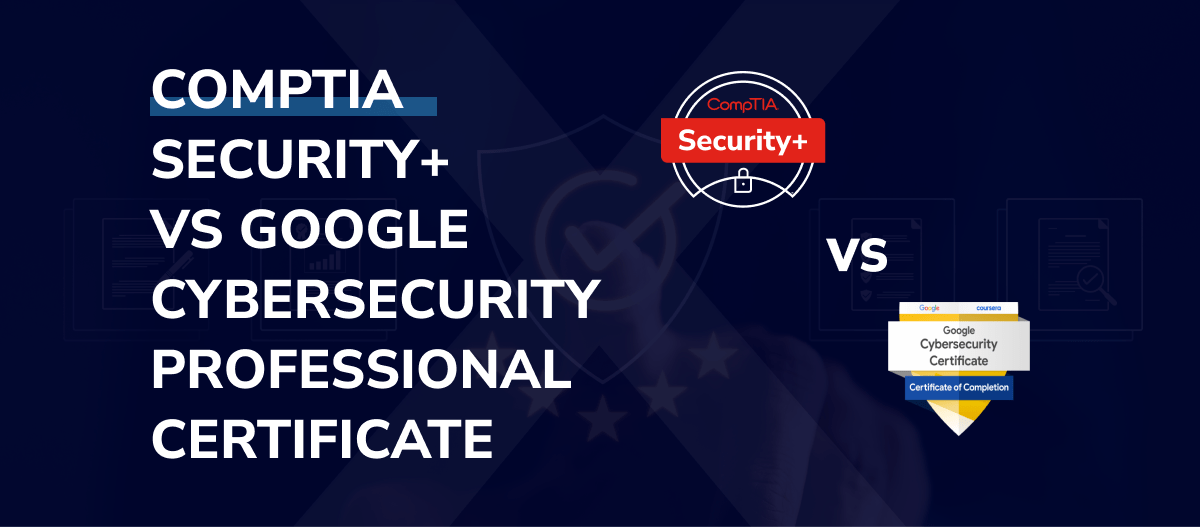Although the SSCP and CISSP cyber security certifications have some overlapping material, many of their characteristics set them apart.
While both have the word security in their name, one certification is slightly more advanced. The certification you decide to pursue will depend on the stage you’re at in your career and professional goals.
So, it’s vital that you have a well-rounded understanding of both certifications before choosing which one to study for.
As the showdown between SSCP vs CISSP kicks off, we’ll examine their differences and help you decide which certification is right for you.
If you’re ready to learn more, let’s start.
What Are SSCP and CISSP Certifications?
The Systems Security Certified Practitioner certification (SSCP) and Certified Information Systems Security Professional certification (CISSP) are vendor-neutral cyber security certifications you may consider obtaining to pursue or further your career as a digital security professional.
The International Information System Security Certification Consortium (ISC2), a highly respected organization specializing in cyber security training and certifications, created both.
About SSCP

The Systems Security Certified Practitioner (SSCP) is an intermediate-level cyber security certification that tests your understanding and mastery of advanced technical skills and digital security knowledge.
You’ll be tested on various subjects, including implementing, monitoring, and administrating IT infrastructure and the best security practices, policies, and procedures.
You’ll be drilled on foundational IT and cyber security knowledge and more advanced topics beyond entry-level IT security knowledge.
To gain a more granular understanding of the certification material, here’s a list of topics that SSCP may test you on:
- System and application security, including mobile device management (MDM) and the configuration of cloud security
- Network security best practices, such as how to best configure firewalls and use network-based security tools
- Public key infrastructure (PKI) and cryptography
- Best incident response and recovery practices, in addition to the creation of a business continuity and disaster recovery plan
- How to manage risk, continuous monitoring techniques, and the analysis of monitoring results
- The application of access and authentication controls
- Differences between technical, administration, and physical controls
- How to securely deploy a range of digital assets throughout their lifetime
SSCP is designed to test your hands-on cyber security skills, so arm yourself with a working knowledge of the skills and techniques you’ll be tested on. Test takers are required to have one year's worth of cyber security experience before being awarded the certification.
If you’re wondering whether this exam is right for you, consider the positions this exam will prepare you for. In addition to IT administrations, managers, directors, and network security professionals, ISC2 provides a list of positions this certification will prepare you for, including:
- Network Security Engineer
- Systems Administrator
- Security Analyst
- Systems Engineer
- Security Consultant/Specialist
- Security Administrator
- Systems/Network Analyst
- Database Administrator
- Health Information Manager
- Practice Manager
About CISSP

The Certified Information Systems Security Professional (CISSP) certification is an advanced cyber security certification that if passed, demonstrates one’s ability to create, execute, and manage a cyber security program.
This exam tests your technical security and managerial and project management abilities.
The ISC2 website claims the CISSP is “the world’s premier cyber security certification.” It’d be easy to write this off as self-aggrandizement; however, as you’ll see when we discuss job prospects for this certification, the label is hard to argue against.
As for the material you’ll be tested on, expect questions testing your understanding of:
- Risk management
- Compliance and regulatory agreements
- Legal issues
- Business continuity
- Security reporting
- Designing cyber security architecture
- Security auditing
Also, be ready for questions that test your administrative expertise and ability to design, execute, and manage your organization’s security posture.
CISSP is for experienced cyber security professionals, such as managers, who want to advance into an even more senior role. ISC2 requires test takers to have five years' experience before receiving the credential, which speaks to how advanced this certification is.
This certification is ideal for the following professionals or for those looking to break into one of the following roles:
- Chief Information Security Officer
- Chief Information Officer
- Director of Security
- IT Director/Manager
- Security Systems Engineer
- Security Analyst
- Security Manager
- Security Auditor
- Security Architect
- Security Consultant
- Network Architect
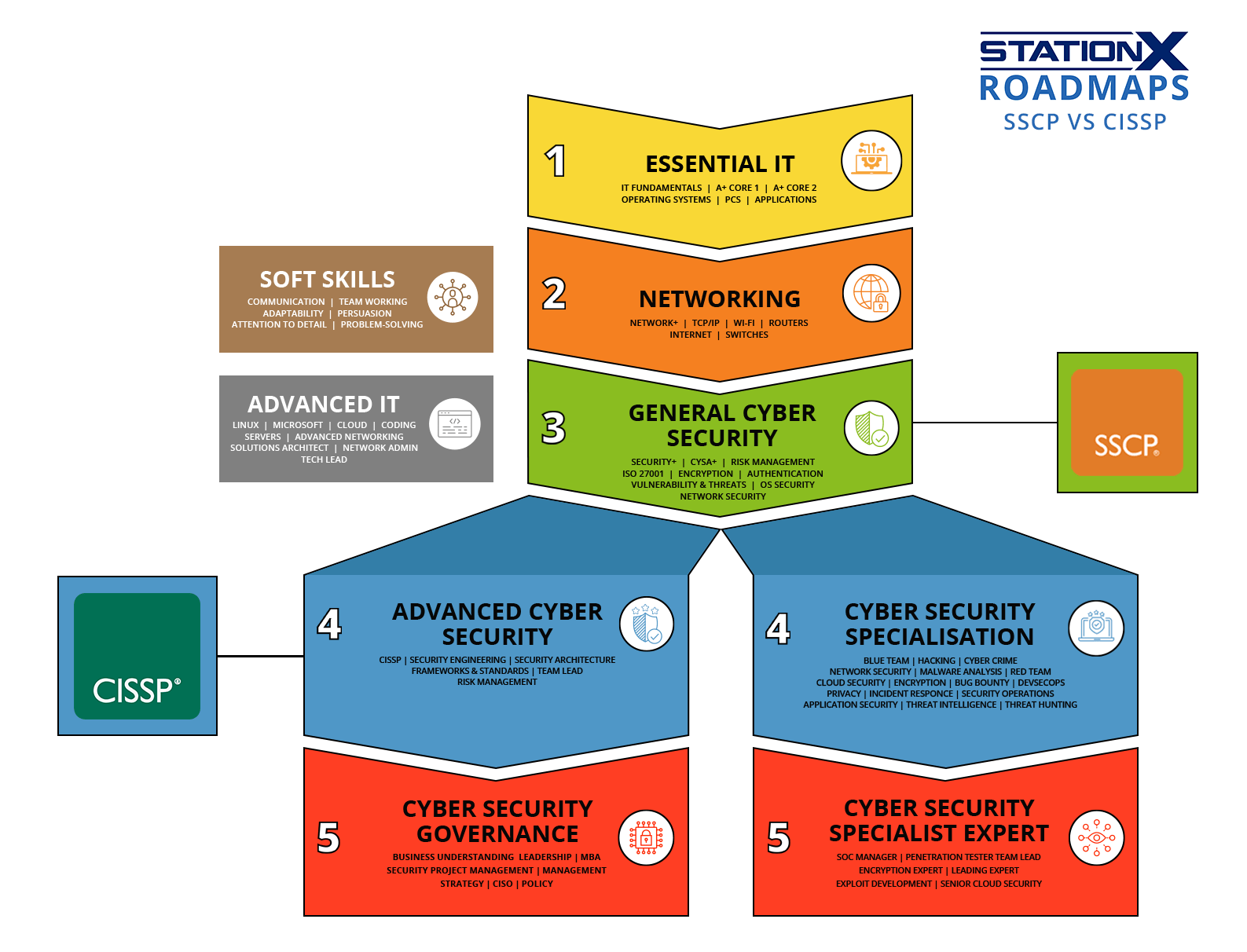
Exam Details
As you can see, the material covered in both SSCP and CISSP overlaps, as the same organization, ISC2, designs both. That being said, there are plenty of differences to be aware of before deciding which exam to study for.
SSCP Exam Details
SSCP is a four-hour exam comprised of 150 multiple-choice questions. You’ll need to score at least 700 out of 1,000 to pass.
In addition to English, the exam is also offered in Spanish, Chinese, Japanese, German, and Korean.
The seven areas of focus and their accompanying weight the SSCP will test you are as follows:
- Domain 1: Security Concepts and Practices – 16%
- Domain 2: Access Controls – 15%
- Domain 3: Risk Identification, Monitoring and Analysis – 15%
- Domain 4: Incident Response and Recovery – 14%
- Domain 5: Cryptography – 9%
- Domain 6: Network and Communications Security – 16%
- Domain 7: Systems and Application Security – 15%
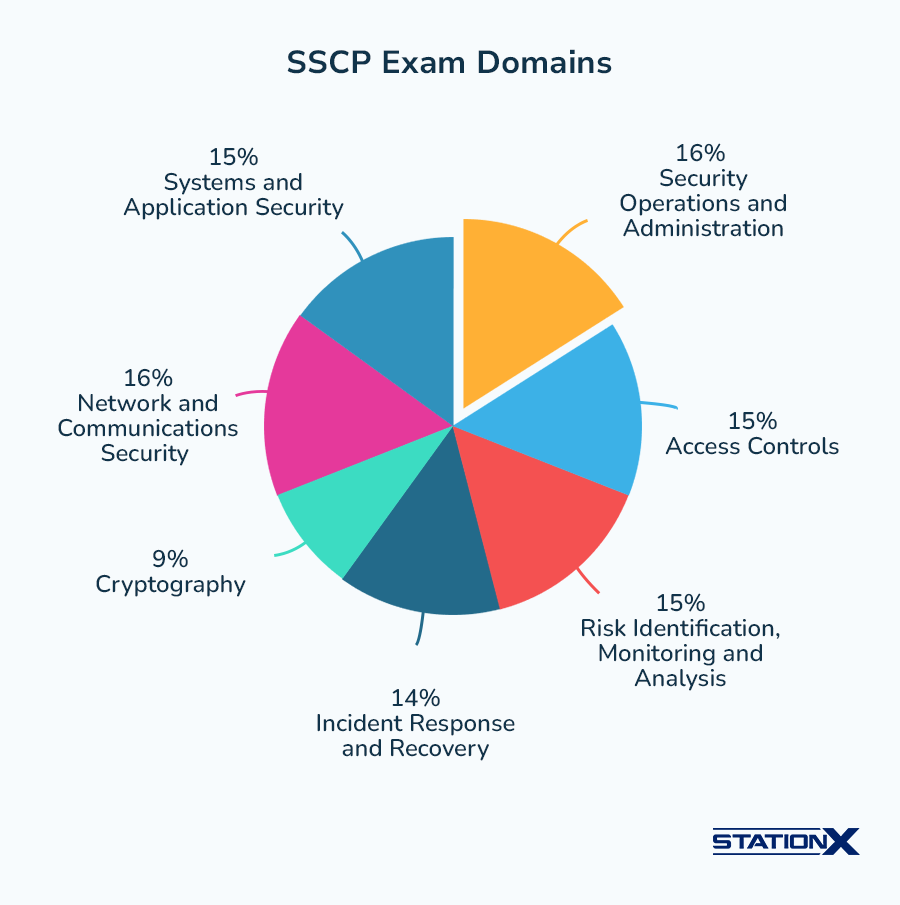
Pearson VUE administers the test, which can be taken at home or at a testing center near you.
CISSP Exam Details
CISSP is also a four-hour exam comprising a variety of questions. If you take the English exam, expect to be tested with the Computerized Adaptive Testing (CAT) format.
This means the total number of questions and their difficulty will depend on your previous answers. In other words, the more questions you answer correctly, the harder the questions will become.
The more difficult the questions, the more points you receive should you answer them correctly. Correctly answering these heavier weighted questions will result in fewer questions being asked and thus a briefer overall exam.
You’ll be tested on multiple-choice and advanced innovative questions—hands-on questions similar to Performance Based Questions found on CompTIA exams—and their number ranges between 100 and 150.
Here’s an example of an Advanced Innovative Question:
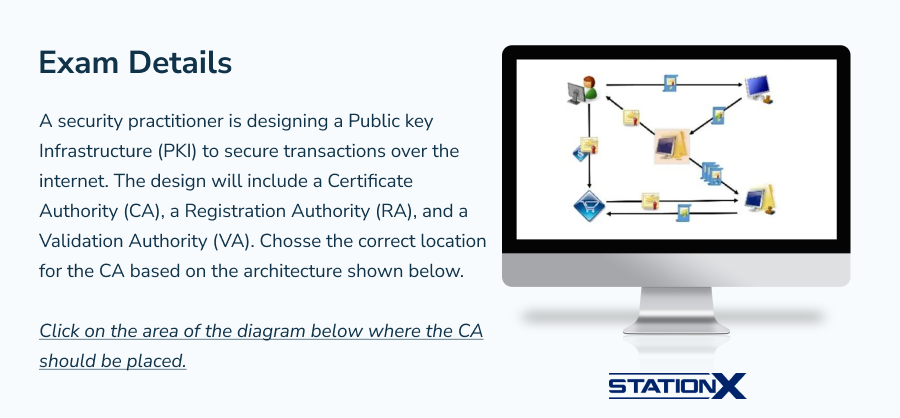
Regarding what you’ll be tested on, the exam can be divided into eight knowledge domains:
- Domain 1: Security and Risk Management – 16%
- Domain 2: Asset Security – 10%
- Domain 3: Security Architecture and Engineering – 13%
- Domain 4: Communication and Network Security – 13%
- Domain 5: Identity and Access Management (IAM) – 13%
- Domain 6: Security Assessment and Testing – 12%
- Domain 7: Security Operations – 13%
- Domain 8: Software Development Security – 10%
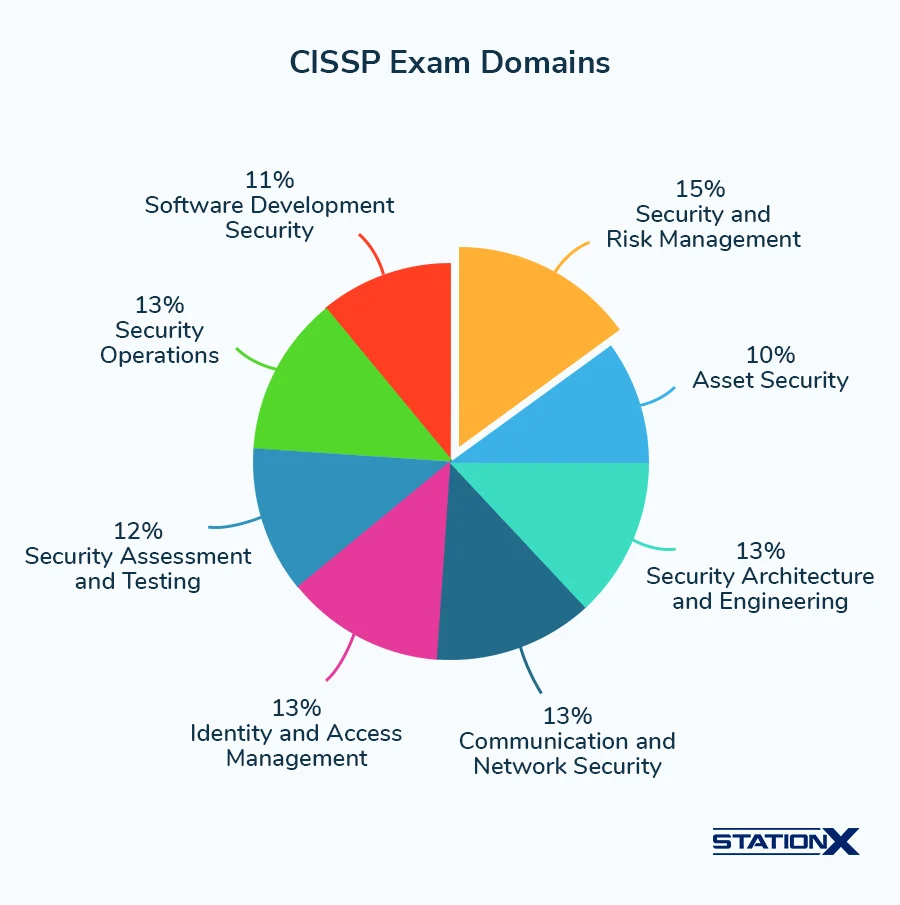
Winner: CISSP
CISSP covers a wider range of security knowledge than SSCP, asks test takers for more in-depth knowledge, and uses Advanced Innovative Questions to gauge their understanding of advanced cyber security topics.
FREE Cyber Security Career Guide
Thinking of a career in cyber security? Our Cyber Security Career Guide walks you through the industry landscape, skill-paths, certifications, and realistic timelines to become job-ready.
Eligibility Requirements
The eligibility requirements for these two exams can be confusing, so let’s set the record straight before you sit down to take either.
SSCP
To be clear, anyone can take the SSCP exam. However, if passed, not everyone will be awarded the certification. Let us explain.
Only if you pass the SSCP exam and have at least one year of related work experience under your belt will you be awarded the certification.
Related work experience counts if you held a position related to at least one of the exam’s knowledge domains.
ISC2 may also accept candidates with a BA or MA in computer science, IT, or a related field in lieu of work experience.
You can do so if you still need to get the required work experience but still want to take the exam.
If you pass, you’ll be awarded the Associate of ISC2. You then have two years to complete one year of work experience to be awarded the SSCP. To be clear, regardless of your work experience, the exam is the same; the only difference is in the title.
CISSP
Like SSCP, ISC2 doesn’t require work experience to take the test. Anyone can do it, but only those with a minimum of five years of work experience will be officially awarded the CISSP title if they pass.
You can achieve one year of required work experience if you have a four-year degree in a related field. One year can also be satisfied by earning one of the certifications on the ISC2 website. Note that only one of the five years of work experience can be substituted.
However, not all work experience will count towards the required five years. Rather, you’ll need at least five years related to at least two of the eight knowledge domains, less if you’ve gone to school or have certain certifications.
Should you pass the exam without the necessary work experience, you’ll be awarded the Associate of ISC2 title. Then, you’ll have six years to earn five years of work experience. You must also receive an official endorsement from a member of ISC2 in good standing.
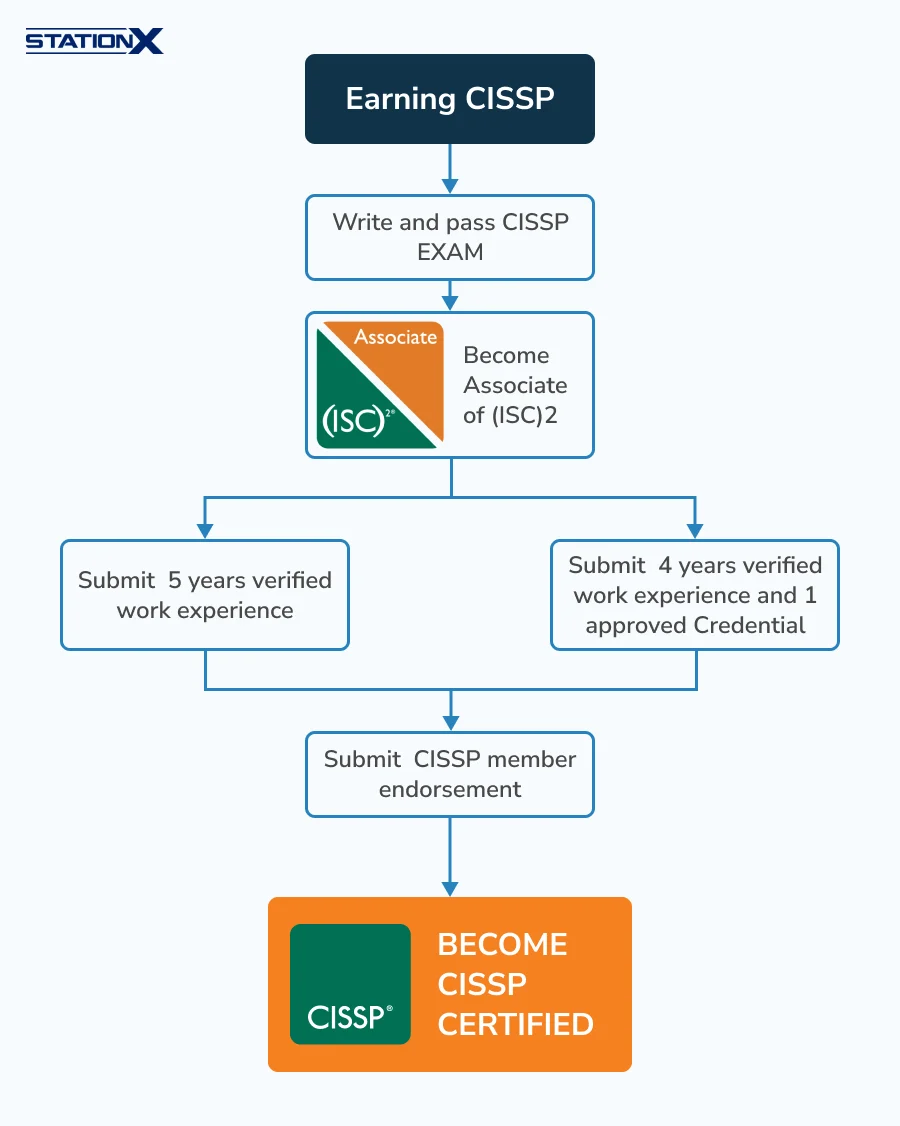
Winner: SSCP
SSCP is the clear winner in this case as you only need one year of related work compared to the five years the CISSP requires.
Exam Difficulty
The difficulty of an exam depends on your prior knowledge of the material. That said, while there’s some material overlap between these two certifications, one exam is more difficult to pass.
SSCP
ISC2 requires test takers to have work experience because this is an intermediate cyber security certification. Possessing a superficial digital security knowledge isn’t enough to pass.
This is a four-hour assessment with up to 150 questions that test you on various security topics, and the exam questions cannot be answered with the help of rote memorization.
Rather, you must think critically through the problem you’re presented with and select the most appropriate solution.
CISSP
ISC2 requires prospective test takers to have five years of digital security experience before taking the exam. The test questions will put you in various complex, real-life situations and ask you to find the correct solution.
Unlike SSCP, CISSP uses the Computerized Adaptive Testing (CAT) grading system. This means that the more questions you answer correctly, the more difficult the questions will become. This dynamic testing system is designed to speed up the exam by asking fewer questions.
You’ll also be tested on a wider range of materials than SSCP. The CISSP will test you on eight knowledge domains, compared to seven.
The CISSP also includes multiple-choice and advanced innovative questions. The latter are more immersive and require higher critical thinking skills than multiple-choice questions.
Remember that the CISSP tests your ability to think like a manager. While this exam will test your technical expertise in various cyber security-related topics, it chiefly focuses on challenges managers and senior-level professionals face.
Winner: SSCP
While both exams have the same passing score and test time, it’s clear that SSCP is the easiest. SSCP requires a more superficial understanding of the material, has a narrower focus, only asks multiple-choice questions, and doesn’t use a dynamic CAT system.
Job Opportunities
You’re looking into taking these certifications to further your career. Which one will help you score your dream job?
SSCP
ISC2 is a highly respected organization, with each of its certifications carrying weight.
As an intermediate certification, SSCP is respected when seeking an entry-level or junior cyber security position.
When we queried Indeed, we found 1,378 jobs asking candidates to have SSCP.
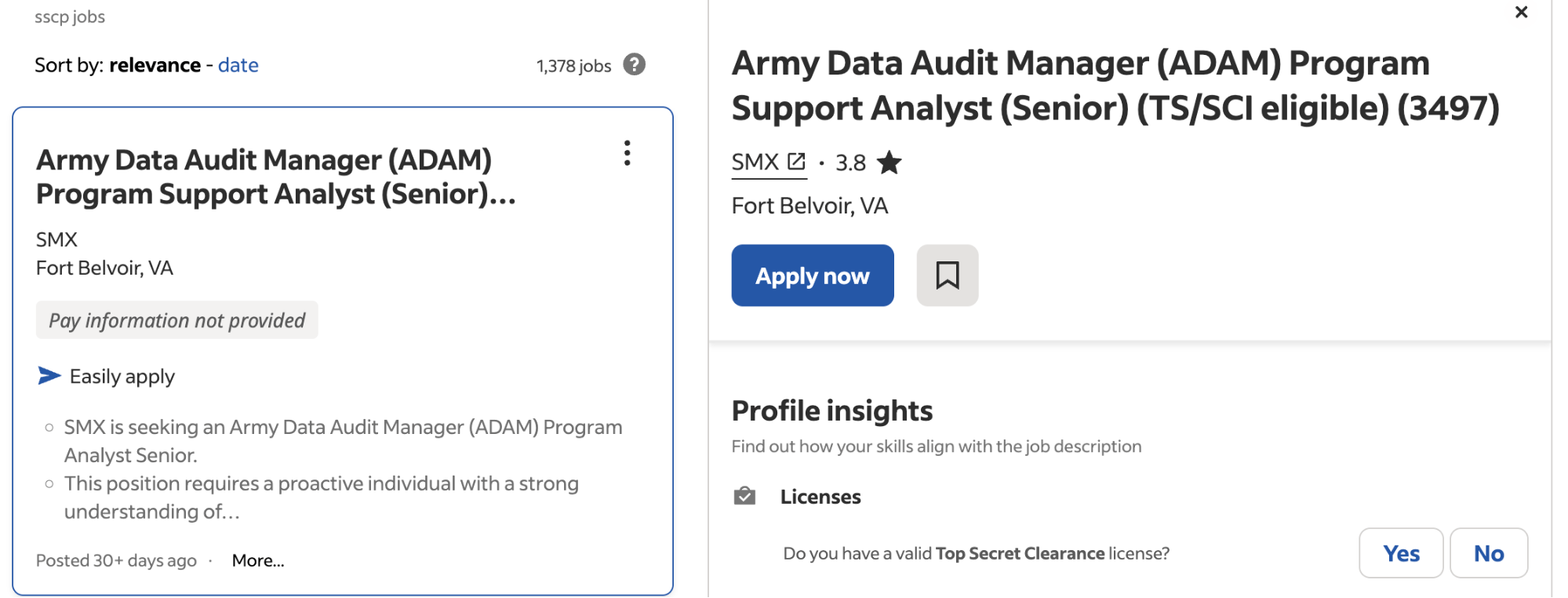
Some positions asking candidates to hold the SSCP include:
- Information Security Analyst
- Principal Systems Software Analyst
- IT Professor
- Information Assurance Specialist
- Senior Cyberspace Threat Intelligence
- Senior Network and Systems Engineer
According to Payscale, the average salary of someone holding an SSCP is $81k USD. However, the salary could range from $50,000 to $128,000 USD.
A couple of certifications we also saw mentioned alongside SSCP that employers would like to see were CompTIA’s Security+ and CCNP Security.
Information Security Courses Bundles
Want lifetime access to expert-led cyber security training? Explore our Information Security Course Bundles — one-time purchase packages covering top topics like Ethical Hacking, Cloud, Linux, DevSecOps, and CompTIA certifications.
CISSP
CISSP is one of the most widely respected advanced cyber security certifications. Once obtained, it demonstrates your ability to design complex and airtight security plans to protect major organizations.
When we queried Indeed for CISSP positions, it returned 6,724 jobs.

Some of the most common positions hiring those that have CISSP to their name include:
- Senior SOAR Engineer
- Senior Analyst
- Security OT Architect
- Information Assurance
- Security Assessor Expert
- Info Security Architect
- Cloud Security Engineer
- IT Security Analyst
- Principal Architect
- Senior Application Security Engineer
According to ZipRecruiter, the average salary for someone with the CISSP certification is $112,302 USD.
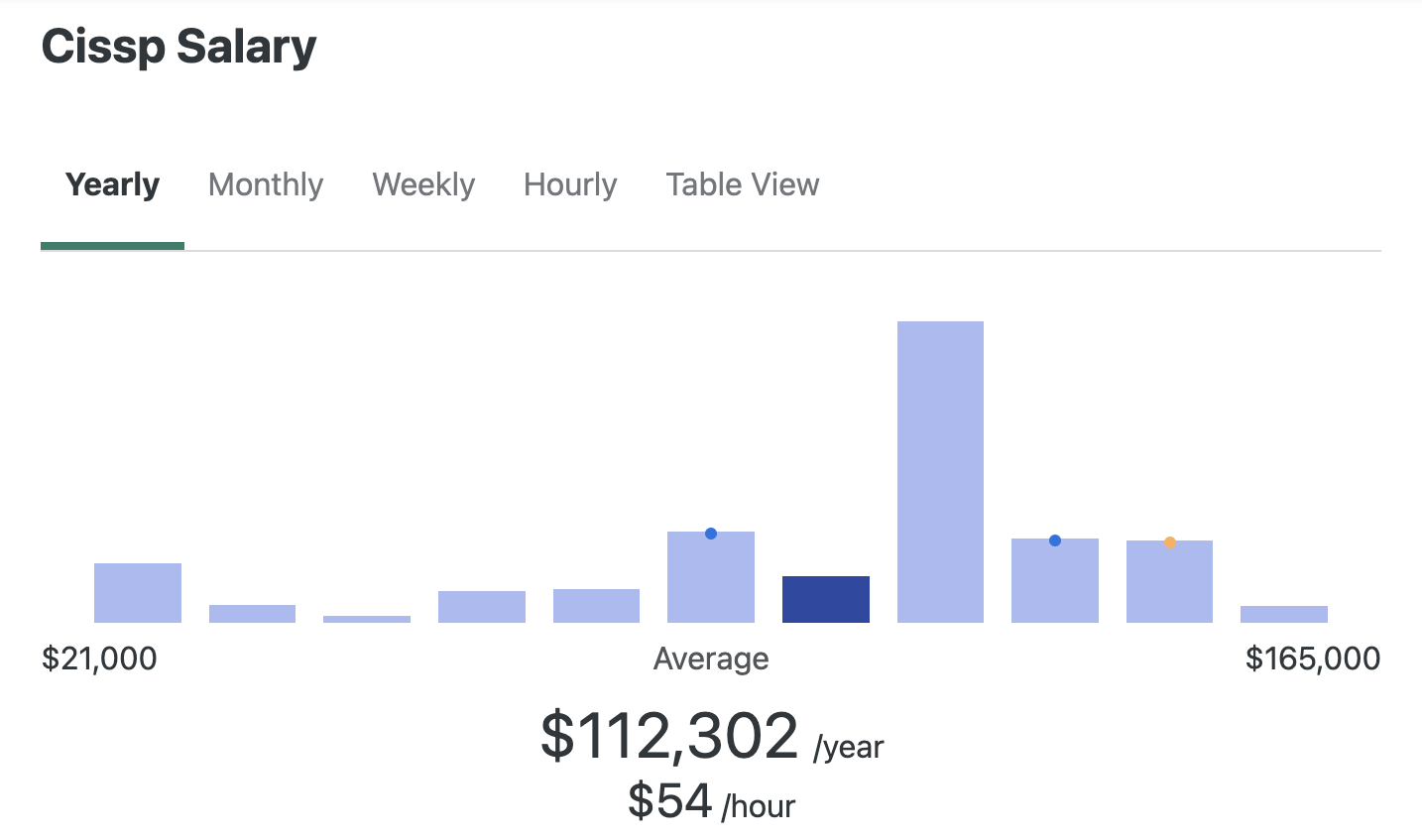
Winner: CISSP
As an advanced cyber security certification, many more companies are looking for candidates with CISSP. Average salaries are $30k USD higher than SSCP salaries.
Cost and Recertification
Each exam comes with its associated costs and recertification requirements.
SSCP
SSCP has a cost of $249 USD.
If you pass the exam, it’s valid for three years. To maintain its validity, you must make an annual payment of $125 USD. You must also obtain 60 Continuing Professional Education (CPE) credits in this three-year period to recertify.
There are many ways to earn CPE credits, from attending webinars, certification training, courses, additional certifications, and more.
CISSP
Since ISC2 also awards CISSP, both certifications have similar recertification guidelines. Like SSCP, CISSP is valid for three years after obtaining it, which can be renewed by retaking the exam or earning CPE credits.
CISSP requires 120 CPEs.
It costs $749 USD and also requires yearly membership fees of $125 USD.
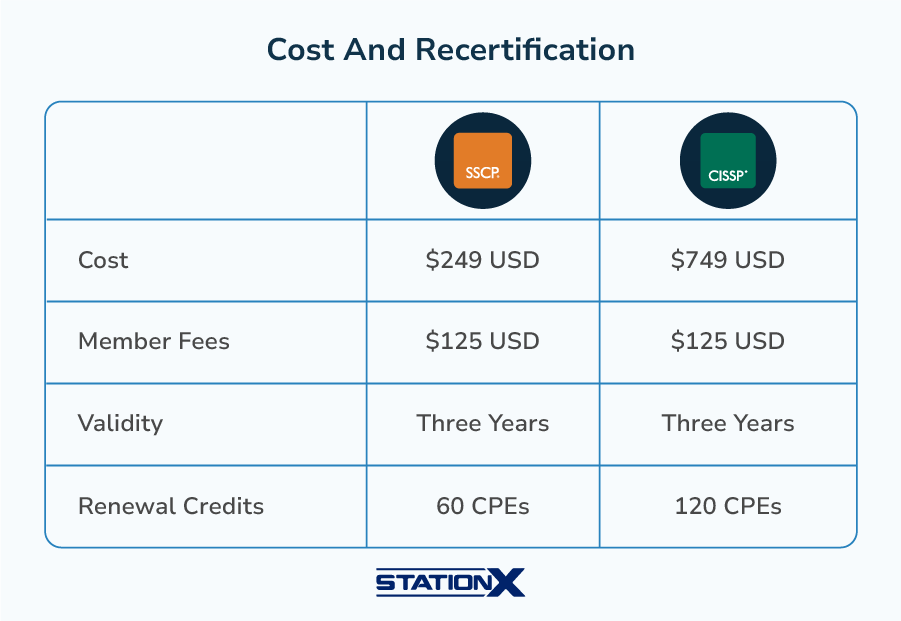
Winner: SSCP
While certifications are valid for three years and have the same membership fees, SSCP is far cheaper than CISSP and requires fewer CPEs.
SSCP vs CISSP: What’s Better?
The certification you decide to pursue between CISSP vs SSCP depends on your current level of cyber security expertise and your goals. That being said, the ideal certification on your resume is CISSP.
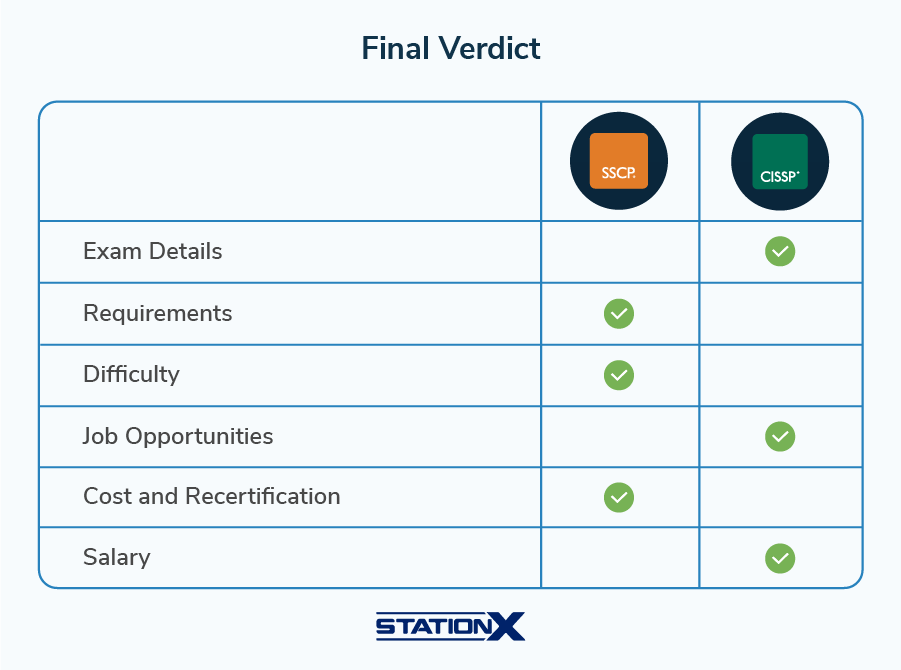
We recommend obtaining a CISSP if you want to quickly move up the ladder and compete for high-quality, high-paying jobs in cyber security.
It’s a widely respected certification that companies want their senior-level cyber professionals to have. We believe it’s the closest thing to a cyber security “industry standard” certification.
If you’re still new to cyber security, consider obtaining an SSCP before CISSP. Consider obtaining an SSCP as a stepping stone to help you get closer to securing CISSP.
To begin studying for CISSP, we recommend joining StationX’s Master's Program. Here, you’ll have access to over 30,000 labs and courses, study groups, a community to support and answer your questions, mentorship, and more.
You can also see our Information Security Training Bundles, granting lifetime access to top courses for a one-time purchase. Learn ethical hacking, cyber security, and prepare for top certifications.
We have bundles on:
- Pentesting, red teaming, and web app hacking
- Certification prep, including CompTIA, ISC2, AWS, Cisco, and Azure
- DevSecOps and Coding
- Linux
- AI
- And much more!



